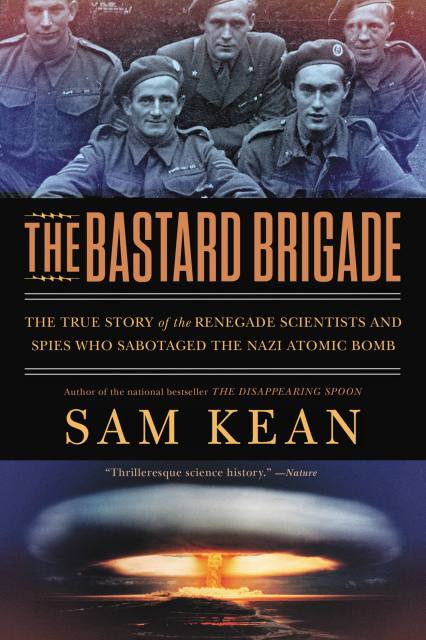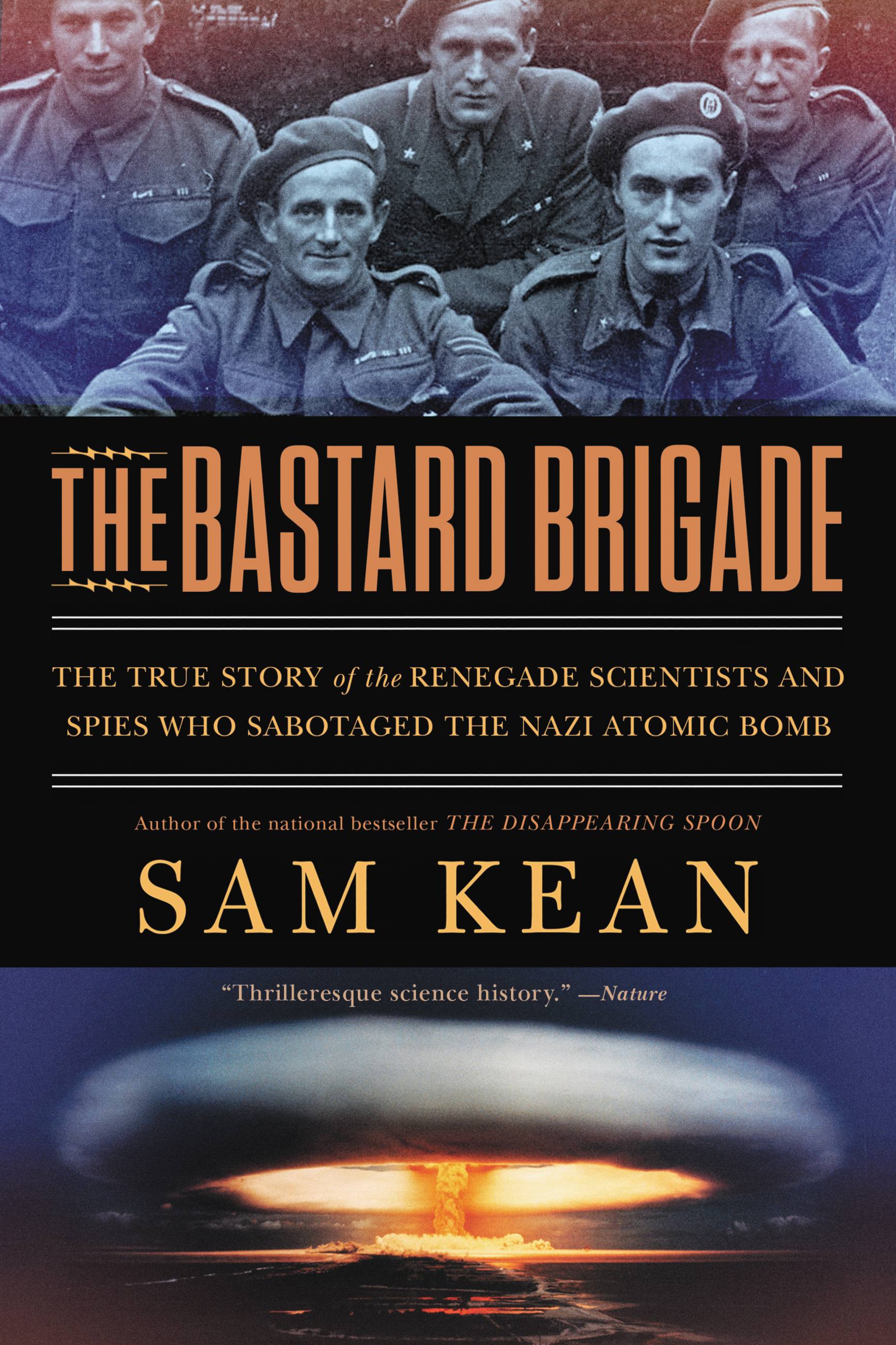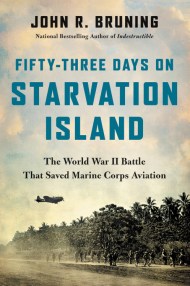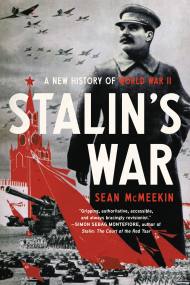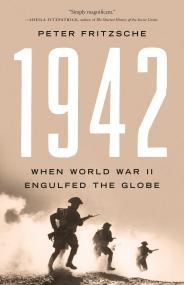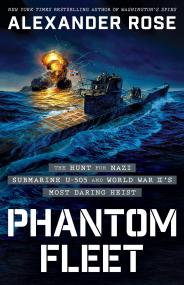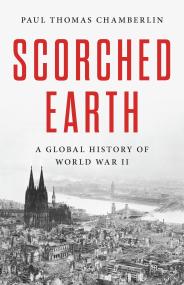By clicking “Accept,” you agree to the use of cookies and similar technologies on your device as set forth in our Cookie Policy and our Privacy Policy. Please note that certain cookies are essential for this website to function properly and do not require user consent to be deployed.
The Bastard Brigade
The True Story of the Renegade Scientists and Spies Who Sabotaged the Nazi Atomic Bomb
Contributors
By Sam Kean
Formats and Prices
- On Sale
- Jul 9, 2019
- Page Count
- 464 pages
- Publisher
- Little, Brown and Company
- ISBN-13
- 9780316381666
Price
$14.99Price
$19.99 CADFormat
Format:
- ebook $14.99 $19.99 CAD
- Audiobook Download (Unabridged)
- Trade Paperback $22.99 $29.99 CAD
This item is a preorder. Your payment method will be charged immediately, and the product is expected to ship on or around July 9, 2019. This date is subject to change due to shipping delays beyond our control.
Buy from Other Retailers:
Scientists have always kept secrets. But rarely have the secrets been as vital as they were during World War II. In the middle of building an atomic bomb, the leaders of the Manhattan Project were alarmed to learn that Nazi Germany was far outpacing the Allies in nuclear weapons research. Hitler, with just a few pounds of uranium, would have the capability to reverse the entire D-Day operation and conquer Europe. So they assembled a rough and motley crew of geniuses — dubbed the Alsos Mission — and sent them careening into Axis territory to spy on, sabotage, and even assassinate members of Nazi Germany's feared Uranium Club.
The details of the mission rival the finest spy thriller, but what makes this story sing is the incredible cast of characters — both heroes and rogues alike — including:
- Moe Berg, the major league catcher who abandoned the game for a career as a multilingual international spy; the strangest fellow to ever play professional baseball.
- Werner Heisenberg, the Nobel Prize-winning physicist credited as the discoverer of quantum mechanics; a key contributor to the Nazi's atomic bomb project and the primary target of the Alsos mission.
- Colonel Boris Pash, a high school science teacher and veteran of the Russian Revolution who fled the Soviet Union with a deep disdain for Communists and who later led the Alsos mission.
- Joe Kennedy Jr., the charismatic, thrill-seeking older brother of JFK whose need for adventure led him to volunteer for the most dangerous missions the Navy had to offer.
- Samuel Goudsmit, a washed-up physics prodigy who spent his life hunting Nazi scientists — and his parents, who had been swept into a concentration camp — across the globe.
- Irène and Frederic Joliot-Curie, a physics Nobel-Prize winning power couple who used their unassuming status as scientists to become active members of the resistance.
Thrust into the dark world of international espionage, these scientists and soldiers played a vital and largely untold role in turning back one of the darkest tides in human history.
-
NPR Science Friday's Best Science Book of 2019
-
"A thrilling tale of wartime derring-do meets a richly researched story of postwar intellectual exploitation . . . . Perfect as a first foray into this period, and I defy any reader not to be drawn into the world of unlikely spies and Nazi Nobel Prize winners that Kean paints so vividly and infuses with such energy."Science
-
"Thrilleresque science history."Nature
-
"An exciting read for fans of World War II history, espionage tales, and the development of nuclear weapons."Library Journal, starred review
-
"Bastard Brigadeis as entertaining as it is fascinating. Kean's colloquial expressions and metaphors provide levity to the gritty history of a world at war, with the survival of freedom, and possibly humanity, hanging in the balance. He never lets the reader forget what was at stake. . .Kean's page-turner about a still too-little-understood chapter in history deserves a prominent place in WWII collections."Booklist, starred review
-
"An exciting history of the battle for atomic supremacy during World War II. . . Throughout, Kean eschews erudite fastidiousness for consistent action and brio. Beginning with the title, the narrative is an engrossing cinematic drama. . . Vivid derring-do moves swiftly through a carefully constructed espionage thriller."Kirkus
-
Praise for Sam Kean:
-
"Riveting.... Kean has a knack for distilling chemistry to its essential elements, using stories and humor.... this is a dose of fresh air.Library Journal
-
"Richly informative.... Once again, Kean proves his mettle as one of science literature's most gifted practitioners."Booklist
-
"Entertaining... with sly wit and boyish wonder"Discover Magazine
-
"Compelling stuff, written with verve and in a style that veers between simple lightheartedness and open jocularity.... Eminently accessible and enjoyable."Robin McKie, The Guardian
-
A "lively tome"New York Post
-
"Science is made fun whenever best-selling author Kean...is narrating."Susannah Cahalan, New York Post
-
"Kean's real knack is for digging up strange details most textbooks leave out....More than an assortment of trivia, the book is an engaging history."Allison Bohac, Science News
-
"A science journalist with a flair for words...[Kean's] language is fluid and accessible, even for the science-challenged."Barbara Hoffert, Library Journal
-
"Kean is one of America's smartest and most charming science writers, and his new book could be perfect for summer readers who prefer some substance with their fun."Michael Schaub, National Public Radio
Newsletter Signup
By clicking ‘Sign Up,’ I acknowledge that I have read and agree to Hachette Book Group’s Privacy Policy and Terms of Use
